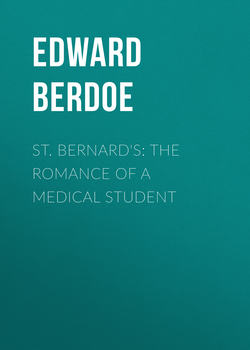St. Bernard's: The Romance of a Medical Student

Реклама. ООО «ЛитРес», ИНН: 7719571260.
Оглавление
Edward Berdoe. St. Bernard's: The Romance of a Medical Student
CHAPTER I. THE FIRST OF OCTOBER
CHAPTER II. THE SCHOOL OF ANATOMY
CHAPTER III. IN STUDENTS’ LODGINGS
CHAPTER IV. HIS ’PRENTICE HAND
CHAPTER V. THE BEADLE AND THE THEATRE
CHAPTER VI. JACK MURPHY’S PARTY
CHAPTER VII. NURSE PODGER
CHAPTER VIII. AMONGST THE OUT-PATIENTS
CHAPTER IX “WALKING THE HOSPITAL.”
CHAPTER X. THE NEW MORALITY
CHAPTER XI. TEA AND ANARCHY
CHAPTER XII “SEND FOR FATHER O’GRADY.”
CHAPTER XIII “THE SOOTHING IDEA OF GOD.”
CHAPTER XIV. THE SACRED WHOLE OF MAN
CHAPTER XV. SCIENCE AND FASHION
CHAPTER XVI. SOWING WILD OATS
CHAPTER XVII. THE LOST LEADER
CHAPTER XVIII. AN EPICURE OF PAIN
CHAPTER XIX. AN APT PUPIL
CHAPTER XX. THE PROFESSOR AT HIS WORK
CHAPTER XXI. TAKEN IN
CHAPTER XXII. HOW ELSWORTH CAME TO HIMSELF
CHAPTER XXIII. IN EXILE
CHAPTER XXIV. THE SCHOOL OF HUMANITY
CHAPTER XXV “WHAT’S BECOME OF WARING?”
CHAPTER XXVI. SISTER AGNES REVOLTS
CHAPTER XXVII “ANOTHER PATIENT, SISTER!”
CHAPTER XXVIII. DR. STANFORTH WITH HIS PUPILS
CHAPTER XXIX. AN IDEAL PHYSICIAN
CHAPTER XXX. SISTER AGNES LEAVES ST. BERNARD’S
CHAPTER XXXI. THE GOSPEL OF WORK
CHAPTER XXXII. THE RISE OF NIGHTINGALE HOSPITAL
CHAPTER XXXIII. MRS. PODGER BECOMES A SIBYL
CHAPTER XXXIV. MR. CROWE PARLEYS WITH THE EVIL ONE
CHAPTER XXXV. THE HOBBY OF DR. SONES
CHAPTER XXXVI. MR. CROWE AT GRANADA
CHAPTER XXXVII. MILDRED LEE
CHAPTER XXXVIII. UNEARTHED
CHAPTER XXXIX. MILDRED FINDS HER WORK
CHAPTER XL “SHOD WITH WOOL!”
CHAPTER XLI. THE TRIUMPH OF MR. MOLE
CHAPTER XLII. THE BACILLUS OF LOVE
CHAPTER XLIII. DR. SONES SUCCEEDS
CHAPTER XLIV. AN INFANT RIVER
Отрывок из книги
Elsworth entered the profession of medicine with a large stock of a commodity just now rather out of fashion with our young men. This limp and degenerate age seems unable to supply our youth with backbone enough to make them enthusiasts about anything beyond dress, the Opera Comique, and the quality of their tobacco. They adopt a profession without at all intending it shall absorb them; they consider it a sign of weakness to show a consuming interest in great subjects, and their energies are frittered away on the most trivial concerns. How many men enter the Church, not as though Heaven-sent messengers, but as affording them a pleasant way of getting on in life! As for a message to mankind or a call from God, it would be too much in the way of the Methodists and Salvation Army people to be consistent with their notions of propriety. What they have to offer the world may be taken or left without interfering in the least with their peace of mind. Hence so many empty churches, while our courts and alleys are full of folk perishing for lack of knowledge which nobody is sufficiently interested to impart, except in a perfunctory manner. It may be all very well for good Mr. Spurgeon to be consumed with desire to save souls; that sort of thing may be consistent with life in the “region of the three D’s” (Dirt, Dissent, and Dulness), over the water. But fancy anybody in Pall Mall or the Row being “so dreadfully in earnest, don’t you know!”
Such being too commonly the case with the Church, what can be expected of medicine? Inaugural addresses and the classic poets notwithstanding, it is rather too much, they say, to expect fellows in the nineteenth century to live up to an ideal guild of St. Luke. Now, by a beautiful instance of the law of compensation ever active in Nature, just as men are voting enthusiasm bad form, women are taking up the work men are too limp and too selfish to perform, and the spectacle is presented to the eye of hundreds of noble, clever, earnest, indefatigable women coming forward to fill the places which men decline, and leaving work more congenial to their habits and tastes, because men lack the energy and sympathy required to effect the necessary reforms. The salt of the earth is now fast becoming a feminine compound.
.....
The coloured diagrams round the walls, and the illustrations in the text-books used, serve to complete our acquaintance with the matter in hand, and its daily repetition fixes it in the memory. The men do their work in great linen blouses or aprons with sleeves. Most of them smoke, and the dissecting-room certainly is one place from which the most violent anti-tobacco agitator would hardly wish to banish it, if he knew how it mitigates its awful odours. When the morning is over, and the men have taken their lunch (they eat sandwiches at their work without the least fastidiousness), few of them return for any more work in that place unless they chance to be very industrious. There are some few men who, in their first and second year, dissect on every available opportunity; for anatomy cannot be crammed, and can only be mastered by this persistent business of the scalpel. Occasionally a visitor will drop in to look round at the work going on; some general practitioner who has been at the school in his early days, to refresh his memory on some point, or to rekindle for a few moments the lost enthusiasm in such studies. Often they tell good stories of the difficulties they had in the olden time of procuring bodies. One old fellow who had been a demonstrator in that room, told one day how, on one occasion some fifty years before, he had been urging the beadle to provide more subjects.
“Can’t get you a fresh ’un before this day week, sir,” replied the man. “You see, sir, it is my mother-in-law. She only died last night. She will be buried on Thursday. We’ll have her up the same night, and she’ll be ready next morning for you.”
.....